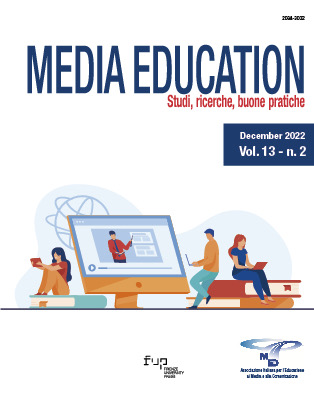Adattamento e innovazione digitale nei servizi per e con le famiglie durante la pandemia Covid19. Dati sulla Regione Lombardia e dai rapporti CISF 2017-2022
Published 2022-11-16
Keywords
- family counseling centres,
- digitalisation,
- families,
- social and health services,
- smartness
Abstract
The paper presents an analysis of the digital change that took place in services for and with families during the Covid19 crisis, through the data of a research conducted in the Lombardy Region with 300 families with children, 48 family consulting services and 50 family associations and through a national longitudinal analysis on CISF data in the years 2017-2022 about the families’ propensity to use digital technology for their needs. The picture outlined by the data shows how the Lombard institutions have responded to the families’ experience, characterized by transversal problems, by activating measures to continue offering their services remotely, through internet and the telephone. Families have often adapted to such new and variable answers that in some cases have failed to satisfy their wishes. Social and health services changed from an adaptive perspective, but do not yet appear fully reflective of the long-term impact of the digital help’s offer. In fact, the post-pandemic scenario of strong digital transformation requires the various welfare actors to strategically rethink support for family relationships and to innovate the smartness, accessibility, and diversification of the help’s offer to intervene incisively in the face of aggravated needs and widened inequalities.
References
- Agcom (2019). Relazione annuale 2019. Disponibile sul sito www.agcom.it
- Agid (2021). Linee Guida sull’infrastruttura tecnologica della Piattaforma Digitale Nazionale Dati per l’interoperabilità dei sistemi informativi e delle basi di dati, Versione 1.0 del 10.12.2021
- Angelidou, M. (2014). Smart city policies: A spatial approach. Cities, 41, S3-S11. DOI: https://doi.org/10.1016/j.cities.2014.06.007
- Aroldi, P. (2017). L’adozione delle ICT nel contesto familiare, in Rapporto CISF 2017. Edizioni San Paolo, pp. 55-58.
- Belletti, F. (2017), L’indagine sulle famiglie, in Rapporto CISF 2017, Edizioni San Paolo, 120-122.
- Carrà, E., Moscatelli, M., Nanetti, S., Ferrari, C., Pavesi, N., Bramanti, D., Bosoni, M. L., & Mazzucchelli, S. (2022). Verso la riforma della L.R. 23/99: un percorso di ricerca partecipativa alla luce del Family Impact Lens, Regione Lombardia.
- CISF (2017). Rapporto CISF 2017. Edizioni San Paolo.
- CISF, Istituto Toniolo (2021). Giovani, famiglia e futuro attraverso la pandemia. Edizioni San Paolo.
- Donati, P. (2017). «L’avvento della ’famiglia ibridata’: come le nuove tecnologie influenzano le relazioni familiari», in CISF (a cura di), Rapporto CISF 2017, 51-54.
- Doran, G. T. (1981). There's a S.M.A.R.T. way to write management's goals and objectives. Management Review. 70 (11): 35–36.
- Gilligan, M., Suitor, J. J., Rurka, M., & Silverstein, M. (2020). Multigenerational social support in the face of the COVID‐19 pandemic. Journal of Family Theory Review, 12(4), 431-447. 10.1111/jftr.12397 DOI: https://doi.org/10.1111/jftr.12397
- Hussein, D., Han, S. N., Lee, G. M., Crespi, N., & Bertin, E. (2017). Towards a dynamic discovery of smart services in the social internet of things. Computers & Electrical Engineering, 58, 429-443. DOI: https://doi.org/10.1016/j.compeleceng.2016.12.008
- Istat (2021). Rapporto annuale sulla situazione del Paese 2020, Roma.
- Komninos, N., & Mora, L. (2018). Exploring the big picture of smart city research. Scienze Regionali, 17(1), 15-38.
- Letaifa, S. B. (2015). How to strategize smart cities: Revealing the SMART model. Journal of business research, 68(7), 1414-1419. DOI: https://doi.org/10.1016/j.jbusres.2015.01.024
- Moscatelli, M. (2022). Tra nuovi bisogni e nuove risposte: i principali risultati dei questionari ai consultori, alle associazioni famigliari e alle famiglie durante la pandemia Covid19. FARE RETE- Un progetto di ricerca azione per la famiglia - Famiglie Resilienti Resistono alle Tempeste. Amazon- Indipendently published.
- Moscatelli, M., Manzella, A., Campostrini, A. (2021). Welfare per sognatori. Esperienze di rigenerazione sociale e urbana attraverso l'arte e la cultura. Mimesis Edizioni.
- Mostaghel, R. (2016). Innovation and technology for the elderly: Systematic literature review. Journal of Business Research, 69(11), 4896-4900. DOI: https://doi.org/10.1016/j.jbusres.2016.04.049
- Muldrew, D. H. L., Fee, A., & Coates, V. (2021). Impact of the COVID‐19 pandemic on family carers in the community: A scoping review. Health & Social Care in the Community, 1-11. https://doi.org/10.1111/hsc.13677 DOI: https://doi.org/10.1111/hsc.13677
- Naldini, M. (2021). Welfare per le famiglie e covid-19. Politiche Sociali, (1/2021), 177-181. https://doi.org/10.7389/100594
- Nanetti, S., Monteduro, G., & Moscatelli, M. (2020). Gli anziani fragili e l’emergenza COVID-19: elementi d’innovazione nel welfare locale. Rivista Trimestrale di Scienza della Amministrazione-Studi di teoria e ricerca sociale, 2/2020.
- Nazioni Unite (2019). Families in a changing world, Progress on the world women 2019-2020. Nazioni Unite.
- Psaroudakis I. (2021). La sfida pandemica per il Terzo settore. L’impatto del Covid-19 in un’analisi qualitativa. Pisa University Press.
- Sanfelici, M., Mordeglia, S., & Gui, L. (2020). Il servizio sociale nell'emergenza COVID-19, Franco Angeli.
- Shibusawa, T., Ishii, C., Nakamura, S., Tamura, T., & Watanabe, T. (2021). The COVID‐19 pandemic and families in Japan. Australian and New Zealand Journal of Family Therapy, 42(1), 58-69. DOI: https://doi.org/10.1002/anzf.1438
- Singh, R., & Sim, T. (2021). Families in the time of the pandemic: Breakdown or breakthrough? Australian and New Zealand Journal of Family Therapy, 42(1), 84-97. DOI: https://doi.org/10.1002/anzf.1445

